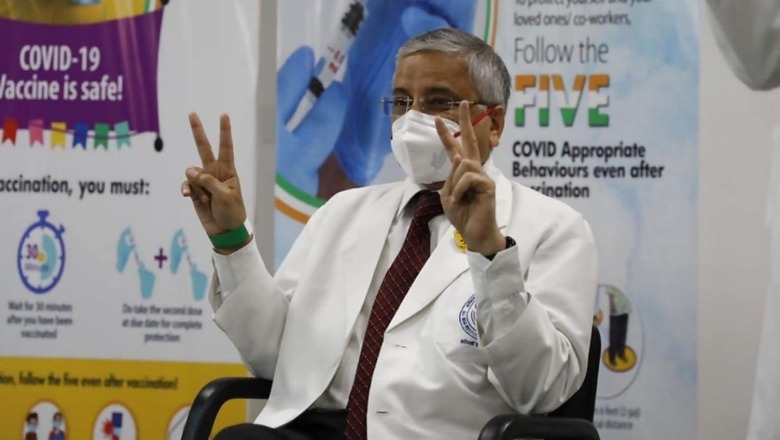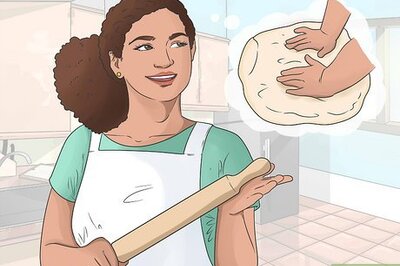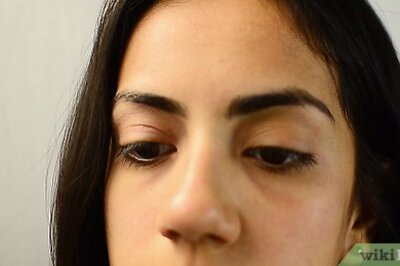
views
If people follow Covid-19 appropriate behavior, and crowds are decreased for a few more months, India may be able to come out of the pandemic with very little mortality, said Randeep Guleria, director of Delhi’s All India Institute of Medical Sciences (AIIMS), on Monday.
In a conversation with CNN-News18’s Marya Shakil, Guleria said that with Covid-19 cases reaching 1 lakh per day, the number was only going to increase. “It’s because of multiple factors, one of them is the lack of Covid appropriate behaviour,” he said.
According to him, the last time India saw such a case-rise, people and administrations were aggressive in curbing the disease, whether it be through individual measures or wide-scale ones, such as testing and tracking. “This time it’s not there, which is why the huge case surge is being witnessed,” he said.
He said people were now also facing Covid fatigue, due to curtailing their daily life and usual activities for a year. “But they need to realise that the disease can be severe, especially in older people,” he said.
Speaking about how the vaccination drive had given people a false sense of security about the pandemic, he said that while the vaccine should be aggressively promoted, Covid-19 appropriate behavior was extremely necessary. “They need to understand that if they follow Covid-appropriate behavior, decrease crowds, just for a few more weeks…maybe for two to three months, we will actually be able to come out of the pandemic with very little mortality, and be back to normal,” he said.
When asked about a few cases where people had tested positive despite being administered their two doses of the vaccine, Guleria said the right question to ask was about the “kind of protection” the vaccine provided.
“Does it protect against infection or disease? And what does that mean? So, if you get the vaccine, there is a very high chance the vaccine will protect you against serious disease where you get hospitalised, require ICU care, or die. But you may still get the infection, but you will be asymptomatic or it will be a mild illness,” he said.
He said these ‘asymptomatic or mild cases’ would still spread the disease to others.
Asked about whether lockdown was the ultimate solution then, Guleria said that instead of a lockdown, containment zones, and ‘mini lockdowns’ within these areas witnessing high cases were the way to go.
Complications as Cases Rise
Guleria also talked about the kind of situations that may arise if the cases continue to go up; stressed healthcare services, and infectious variants taking control. “There are 1 lakh cases, and as we move along, we will have one variant which will become the dominant circulating variant. It seems in some areas, the new UK variant is taking over from the older variant, and is becoming the dominating variant, and therefore is also contributing to the spread of infection,” he said.
Warning against a further surge, he said a large population was still susceptible to the virus. “When we say 50 per cent of people have antibodies, that means 50 per cent don’t have antibodies. We still have half the population at least. Sero surveillance data, at a national level, shows that only 21 per cent people have antibodies. That means 80 per cent of people are still susceptible. That means we have a large population that can still get the infection, and if we have a variant that spreads quickly, and we develop a situation we have crowds of people wearing masks…we are actually allowing this infection to spread very rapidly and it will spread like wildfire and our cases will become huge,” he said.
He said it was a cause for concern because once India’s cases rose to that extent, hospital admissions would also increase proportionally. “We will get a huge strain on our healthcare system. That means more admissions, more ICU beds, which will stretch the healthcare services. Remember, we are now in a situation unlike last time, where we have a large number of non-covid cases also,” he said.
Giving an example, Guleria said that during the lockdown, road accidents had decreased, but now with traffic on the roads, these cases also needed to be dealt with. “Now, roads are jammed, there are still a large number of head injuries, accidents coming to emergency…we can’t deny them admission. So non-covid care has also gone up, covid care has also gone up dramatically, and hospital resources have remained the same,” he said.
He said people needed to be encouraged to come in more and more numbers so that those in the priority group could get vaccinated in their full capacity, and the next age group could be targeted; which would help break the chain of transmission. “We still haven’t reached full capacity in most vaccination sites. Many sites are only meeting 30 per cent of their capacity,” he said.
Talking about drugs used in the treatment of the disease, he said that unlike vaccines, there were not a lot of breakthroughs there. “A lot of work is being done, but unlike vaccines, not a lot of breakthroughs have been seen as far as anti-viral medicines are concerned. Which is why Covid-19 appropriate behavior is very necessary,” he said.
Read all the Latest News, Breaking News and Coronavirus News here. Follow us on Facebook, Twitter and Telegram.

















Comments
0 comment